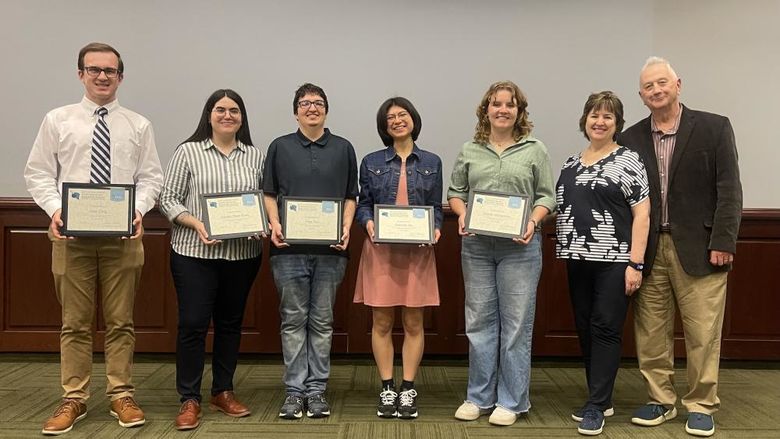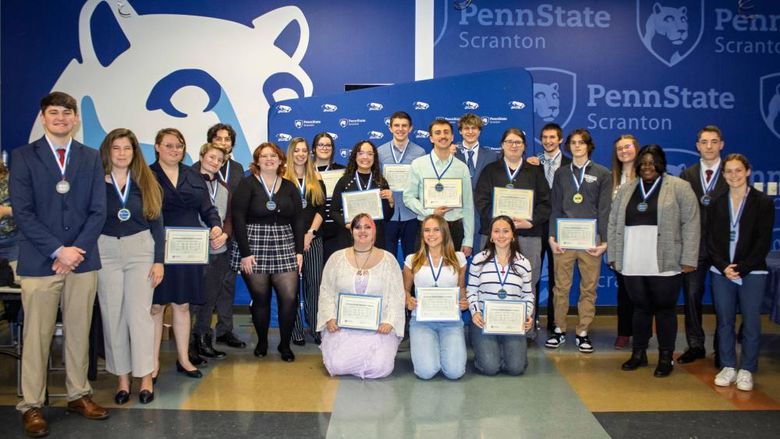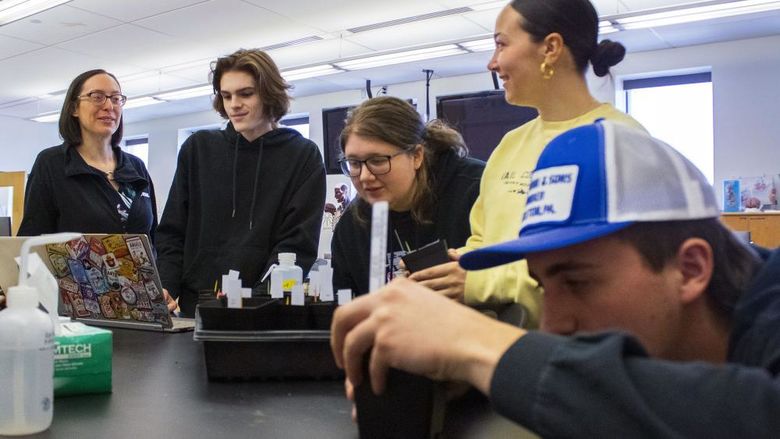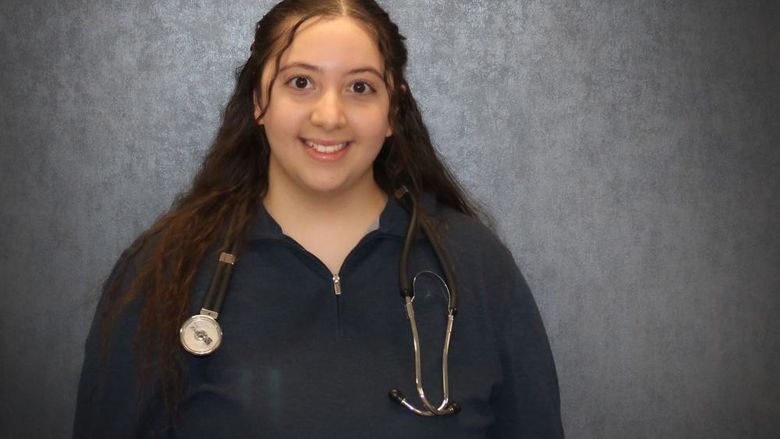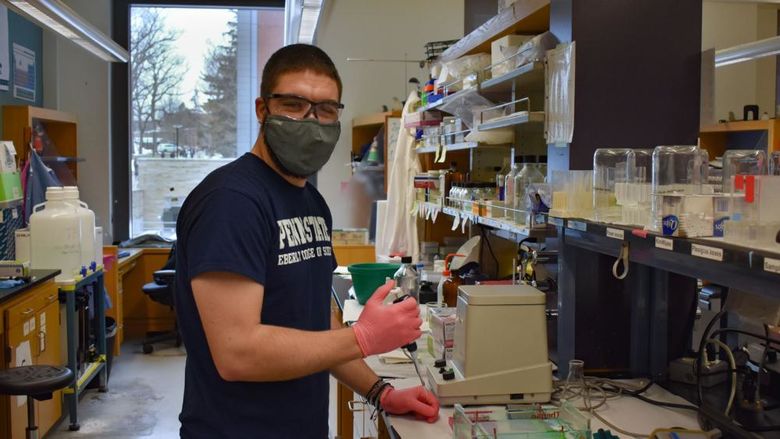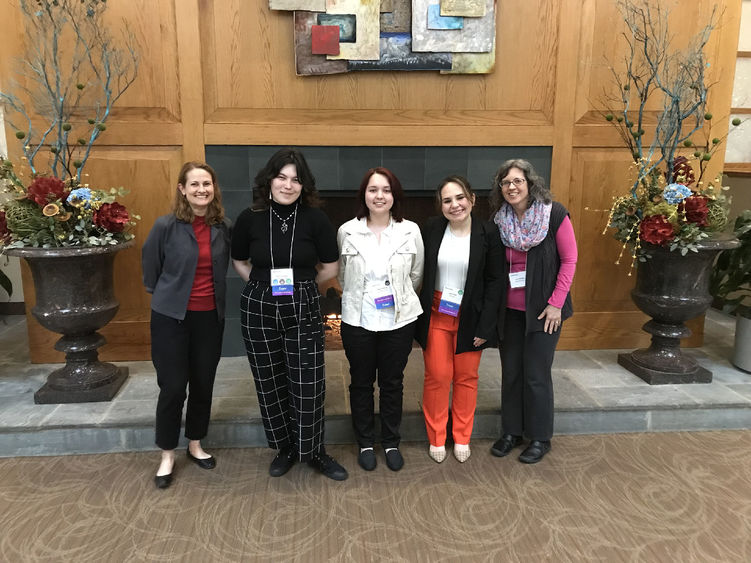
Penn State Scranton's Writing Center Coordinator Jamie Moser and Assistant Teaching Professor of English Jody Griffith recently accompanied students to the Mid-Atlantic Writing Centers Association Conference, where they presented their own works and had the opportunity to network with writing center peers. Pictured from left are: Griffith, students Rowan Mulligan, Taylor Belknap and Halle O’Neil, and Mosher.
DUNMORE, Pa. — Penn State Scranton students attended the Mid-Atlantic Writing Centers Association (MAWCA) Conference, where they joined writing center peers from across the region to discuss writing, collaboration and emerging technologies.
Writing Center Coordinator Jaime Mosher and Assistant Teaching Professor of English Jody Griffith accompanied students Rowan Mulligan, Taylor Belknap and Halle O’Neil to the event, which was themed “Technology and Humanity in the 21st Century Writing Center.”
“The focus was on the intersection of these wider topics,” Mosher said. “In addition to the opening workshop and keynote presentation, four sessions were offered with four options per session that students could choose from based on their areas of interest. There were a variety of formats provided, such as workshops, roundtable discussions, panels and individual presentations.”
Student Halle O’Neil presented her project, "Bringing Asynchronous Tutoring Methods to our Learning and Writing Center," which was originally featured at Penn State Scranton’s Undergraduate Research Fair and Exhibition last year.
“This experience was really special because Dr. Griffith served as my mentor for this project and she was able to attend the conference to see me present,” O’Neil said. “I received so much encouragement from not only her, but the Learning and Writing Center as well — and Jaime and I are working to get some of the methods I researched implemented in our center, which is super exciting.”
According to Mosher, one of the most valuable aspects of the conference was learning how other institutions are expanding their writing center services.
“We benefited from hearing how other centers are collaborating with faculty and other departments on their campuses to broaden the scope of the services their writing centers have traditionally offered,” she said. “There was also a significant focus on generative AI (artificial intelligence) including an analysis of feedback provided by Grammarly, a widely used tool in higher education.”
Mosher said the exposure to evolving perspectives on artificial intelligence and writing helped students think more critically about the role of writing centers.
“It was helpful for the students to be exposed to the different strands of thought around these tools and to think carefully about the role of the writing center in navigating the ever-changing landscape of AI,” she said.
In addition to the academic benefits, Mosher said students also gained important interpersonal experience.
“They met strangers who quickly became new friends, as often happens when you encounter others who can relate to your experiences,” she said. “These interactions allowed them to practice soft skills in a warm and welcoming environment.”
O’Neil said she left the conference feeling encouraged and better prepared for future academic and professional work.
“I feel like I gained a lot from this experience and was happy to do my first conference oral presentation,” she said. “I gained confidence in my research and presentation skills and got to network with some really talented people.”
Funding from the Student Engagement Network Grant made the trip possible for the student tutors.
“Without this grant, I would not have been able to attend the conference,” O’Neil said. “Additionally, Jaime worked tirelessly to help set up our accommodations and make the entire trip possible. It was able to be a stress-free experience for our students because of her excellent work.”
Mosher emphasized the importance of opportunities like MAWCA for student growth and collaboration.
“Attending conferences like these help students to realize they are not alone in their experiences, that students in universities across the country are working in similar settings and are faced with the same issues they are,” she said. “We return filled with new ideas and excited for the opportunity to implement them in our center as we continue to work together to help our students succeed.”
